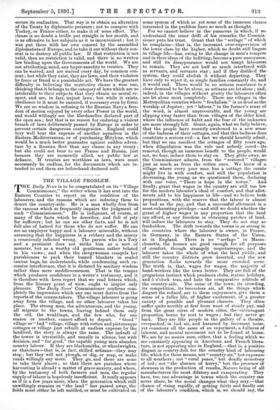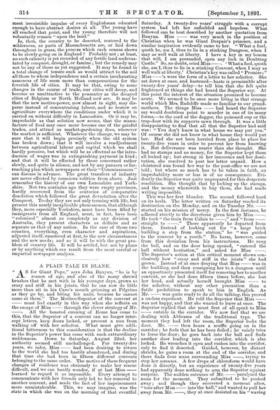THE VILLAGE PROBLEM. T HE Daily News is to be congratulated
on its " Village Commissioner," the writer whom it has sent into the Eastern Counties to report on the condition of the labourers, and the reasons which are inducing them to desert the country-side. He is a man wholly free from the rancour which so frequently impairs the judgment of such " Commissioners." He is indignant, of course, at many of the facts which he describes, and full of pity for sufferers ; but he can see other facts, and he is not full also of hatred for those who do not suffer. He can see an employer happy and a labourer miserable, without assuming that the happiness is a robbery and the misery a consciously inflicted wrong. The parson who is a Tory and a pessimist does not strike him as a sort of monster, but as a worthy old gentleman rather belated in his views ; and when the clergywoman compels her parishioners to pack their loaned blankets in sealed canvas bags, he understands, while condemning such ex- cessive interference, that it is dictated by sanitary wisdom rather than mere meddlesomeness. That is the temper which produces confidence in a writer's testimony, and it is therefore with keen regret that we read letters which, from the literary point of view, ought to inspire only pleasure. The Daily News' Commissioner confirms com- pletely the impression which any one must derive from the reports of the census-takers. The village labourer is going away from the village, and no other labourer takes his place. The strong men, the adventurous, and the young, all migrate to the towns, leaving behind them only the old, the weaklings, and the few who, for one reason or another, cannot afford to depart. " Good" village or " bad " village, village with rotten and picturesque cottages or village just rebuilt at endless expense by the landlord, the story is always the same. The indraft of the towns is irresistible, and usually in silence, but with decision, and " for good," the capable young men abandon country labour. If they are blacksmiths, or wheelwrights, or thatchers—that is, in fact, skilled artisans—they may stop ; but they will not plough, or dig, or reap, or make roads willingly any more. They go, and there are none to take their places ; so that there are parishes where harvesting is already .a matter of grave anxiety, and where, by the testimony of both farmers and men, the regular supply of labour is hopelessly insufficient. It really appears as if in a few years more, when the generation which still unwillingly remains on "the land" has passed away, the fields must either be left unfilled, or must be cultivated on some system of which as yet none of the immense classes interested in the problem have so much as thought. For we cannot believe in the panaceas in which, if we understand the inner drift of his remarks, the Commis- sioner puts his trust. Grant that the " serfage " of which he complains—that is, the incessant over-supervision of the lower class by the higher, which no doubt still lingers• in village life—has, owing to the change in men's tempers and in their ideas of the befitting, become a pure annoyance, and still its disappearance would not tempt labourers to remain. They are not half so much interfered with as servants, and servants stay ; and if they disliked the- system, they could abolish it without departing. They have only to reject it, as single families constantly do, and it would end. There would be no serious resistance to a clear demand to be let alone, as artisans are let alone ; and, indeed, in the villages without gentry the labourers often are let alone most completely. There are villages in the Metropolitan counties where " feudalism " is as dead as the worship of Jupiter; yet "labour," in the farmer's sense of the word, is almost unprocurable, and the young are slipping away faster than from villages of the older kind, where the influence of habit and the fear of the unknown are more strongly felt. Grant, again, what we fully believe, that the people have recently awakened to a new sense of the badness of their cottages, and that this badness does constitute a serious evil—a fact we should heartily admit_ but that we can recollect the cottages of fifty years ago, when dilapidation was the rule and nobody cared—its. removal, though an immense benefit to the people, would not, we fear, induce them to stay on. They glide away, as the Commissioner admits, from the " restored " villages just as much as from the rotten ones. We know of a village where every poor man has a cottage the curate might live in with comfort, and still the population is decreasing, the young, as we questioned them, declaring with one voice, " There is hope in the towns." And finally, grant that wages in the country are still too low for the modern labourer's ideal of comfort, and that allot- ments add to his happiness in life—and we believe both propositions, with the reserve that the labour is almost as bad as the pay, and that a successful allotment is ao most exhausting privilege—and still we doubt whether the grant of higher wages in any proportion that the land can afford, or any freedom in obtaining patches of land, will induce the labourers to stay. They do not stay as. freeholders. The drift towards the towns is as strong in the countries where the labourer is owner, in France, in Germany, in the Eastern States of the Union, as in England. There is no " serfage " in Massa- chusetts, the houses are good enough for all purposes of comfort, though strangely unpicturesque, and the labourer takes the whole of what the land yields ; and, still the country districts grow deserted, and the new generation flocks towards the more crowded scene. The truth is, that, wages for wages, the majority of hand-workers like the town better. They are full of the gregarious instinct which produces clubs, statute holidays, and 5 o'clock teas, and hate the comparative solitude of the country-side. The noise of the town, its crowding, its competition, its breezeless air, all the things which disgust the refined, are to them enjoyments, give them a sense of a fuller life, of higher excitement, of a greater. variety of possible and pleasant chances. They often suffer quite terribly at first from want of steady pay, and, from the great curse of modern cities, the• extravagant proportion borne by rent to wages ; but they never go. back. They are like people in the • gallery of a theatre, overpacked, in bad air, and harassed by incessant noise, yet conscious all the same of an enjoyment, a fullness of interest, and mental movement not to be found at home. We are by no means sure, either, that a feeling which we see constantly appearing in American and French litera- ture, is not appearing also in England,—that is, a positive disgust in country-folk for the country kind of labouring life, which for them means, not " country air," but exposure to all weathers ; not " rural peace," but deadly monotony of toil ; not " the absence of hurry," but the presence of slowness in the production of results, Nature being of alb manufacturers the most dilatory and exasperating. They have, too, one advantage in towns which the country can never share, be the social changes what they may,—that chance of rising rapidly, of getting fairly and finally ont of the labourer's condition, which is, we should say, the most irresistible impulse of every Englishman educated enough to have abstract desires at all. The young have all reached that point, and the young therefore will not voluntarily remain " upon the land." Is, then, the country to be deserted, restored to the wilderness, as parts of Massachusetts are, or laid down throughout in grass, the process which each census shows to be slowly going on in England ? Probably not ; at least, no such calamity is yet recorded of any fertile land undevas- tated by conquest, drought, or famine ; but the remedy may not be any of those as yet suggested. It may be found in a total change of tenure such as would attract to the soil all those to whom independence and a certain inexhausting sameness of life seem more than compensations for the feverish life of cities. It may be that, owing to some changes in the course of trade, our cities will decay, and become as unattractive to the peasantry as the decayed cities of Belgium or North Holland now are. It may be that the new motive-power, now almost in sight, may dis- perse instead of concentrating labour, and so bestow on agriculture everywhere the conditions under which it is carried on without difficulty in Lancashire. Or it may be, improbable as that solution now seems, that the manu- facture of food may once more become one of the gainful trades, and attract as market-gardening does, wherever the market is sufficient. Whatever the change, we may be sure that it will begin precisely when the old system has broken down • that it will involve a readjustment between agricultural labour and capital which we shall hardly perceive, but which will be as effectual as the intro- duction of wages was in extinguishing payment in kind ; and that it will be effected by those concerned rather slowly, and quite in silence, and not by any panacea or far- reaching plan which newspapers or their "Commissioners " can discuss in advance. The great transfers of industry are never effected by conscious volition from above. Just remember the history of our own Lancashire and York- shire. Not two centuries ago they were empty provinces, hardly recovered from the centuries of comparative desolation which followed the great devastation after the Conquest. To-day they are not only teeming with life, but present this nearly inexplicable phenomenon, that although they, more especially Yorkshire, must have been filled by immigrants from all England, must, in fact, have been " colonised " almost as completely as any division of Australia, they present characters as definite and as separate as that of any nation. In the case of those two counties, everything, even character and aspirations, adjusted itself, unnoticed at first, to the new circumstances and the new needs ; and so it will be with the great pro- blem of country life. It will be settled, but not by plans or by anything which can result from the most careful or impartial newspaper analysis.



































 Previous page
Previous page